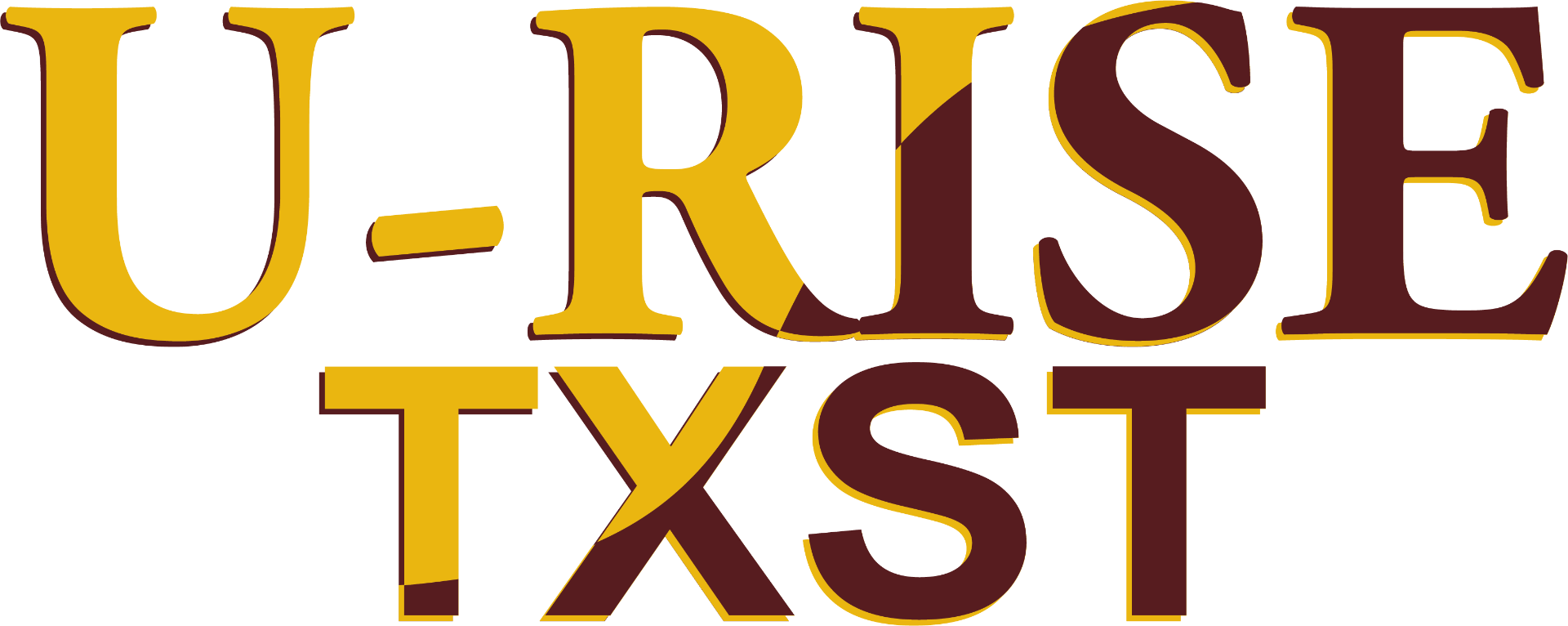The Texas State U-RISE Program has been terminated by the National Institutes of Health.
No new applications can be considered.
Who can apply to U-RISE?
The goal of this program is to increase representation across the biomedical research enterprise. Each applicant is evaluated holistically to honor every individual’s lived experience, in accordance with federal law. Therefore, all students are invited and welcome to apply!
In November 2019, the NIH defined “underrepresented populations” in biomedical sciences to include (but not limited to) the following evidence-based groups of people whose identities and lived experiences. We especially encourage people who identify with one or more of the following descriptions to apply to Texas State U-RISE.
A. Individuals from racial and ethnic groups that have been shown by the National Science Foundation to be underrepresented in health-related sciences on a national basis (see data at http://www.nsf.gov/statistics/showpub.cfm?TopID=2&SubID=27) and the report Women, Minorities, and Persons with Disabilities in Science and Engineering). The following racial and ethnic groups have been shown to be underrepresented in biomedical research: Blacks or African Americans, Hispanics or Latinos, American Indians or Alaska Natives, Native Hawaiians and other Pacific Islanders. In addition, it is recognized that underrepresentation can vary from setting to setting; individuals from racial or ethnic groups that can be demonstrated convincingly to be underrepresented by the grantee institution should be encouraged to participate in NIH programs to enhance diversity. For more information on racial and ethnic categories and definitions, see the OMB Revisions to the Standards for Classification of Federal Data on Race and Ethnicity (https://www.govinfo.gov/content/pkg/FR-1997-10-30/html/97-28653.htm).
B. Individuals with disabilities, who are defined as those with a physical or mental impairment that substantially limits one or more major life activities, as described in the Americans with Disabilities Act of 1990, as amended. See NSF data at, https://www.nsf.gov/statistics/2017/nsf17310/static/data/tab7-5.pdf.
C. Individuals from disadvantaged backgrounds, defined as those who meet two or more of the following criteria:
-
-
- Were or currently are homeless, as defined by the McKinney-Vento Homeless Assistance Act (Definition: https://nche.ed.gov/mckinney-vento/);
- Were or currently are in the foster care system, as defined by the Administration for Children and Families (Definition: https://www.acf.hhs.gov/cb/focus-areas/foster-care);
- Were eligible for the Federal Free and Reduced Lunch Program for two or more years (Definition: https://www.fns.usda.gov/school-meals/income-eligibility-guidelines);
- Have/had no parents or legal guardians who completed a bachelor’s degree (see https://nces.ed.gov/pubs2018/2018009.pdf);
- Were or currently are eligible for Federal Pell grants (Definition: https://www2.ed.gov/programs/fpg/eligibility.html);
- Received support from the Special Supplemental Nutrition Program for Women, Infants and Children (WIC) as a parent or child (Definition: https://www.fns.usda.gov/wic/wic-eligibility-requirements).
- Grew up in one of the following areas: a) a U.S. rural area, as designated by the Health Resources and Services Administration (HRSA) Rural Health Grants Eligibility Analyzer (https://data.hrsa.gov/tools/rural-health), or b) a Centers for Medicare and Medicaid Services-designated Low-Income and Health Professional Shortage Areas (qualifying zipcodes are included in the file). Only one of the two possibilities in #7 can be used as a criterion for the disadvantaged background definition.
-
Students from low socioeconomic (SES) status backgrounds have been shown to obtain bachelor’s and advanced degrees at significantly lower rates than students from middle and high SES groups (see https://nces.ed.gov/programs/coe/indicator_tva.asp), and are subsequently less likely to be represented in biomedical research. For background see Department of Education data at, https://nces.ed.gov/; https://nces.ed.gov/programs/coe/indicator_tva.asp; https://www2.ed.gov/rschstat/research/pubs/advancing-diversity-inclusion.pdf.
Apply to be a U-RISE Scholar!
Applications for the 2024-25 academic year are now open.
The application deadline is 6 pm on September 2, 2024 for all materials to be received via email to uriseadmin@txstate.edu.
2022-23 TxSt U-RISE Application Package
Application Instructions:
Please first review the U-RISE Application Form and the Memorandum of Understanding (MOU), which outlines expectations and benefits for appointment as a U-RISE Scholar. You will complete the application form now, and complete the MOU upon appointment as a Scholar.
- Complete all sections of the U-RISE Application Form.
- Complete the self-assessment survey (also linked on the first page of the application form).
- Arrange for two letters of recommendation from faculty members to be sent directly to Program Administration (uriseadmin@txstate.edu).
- Make sure that at least one of these references is in a U-RISE participating department.
- Identify your letter-writers in Section D. of the Application Form.
- Complete your Personal Statement in Section E of the Application Form. Attach additional pages if needed.
- Submit transcripts for all college-level classes taken since high school. Unofficial transcripts from Texas State are acceptable.
- Submit an updated resume that highlights your academic and extracurricular achievements, as well as any additional qualifications or personal strengths that you would like to highlight to the U-RISE Admissions Committee.
All materials, excluding the letters of reference, should be submitted via email as PDF files to uriseadmin@txstate.edu.
